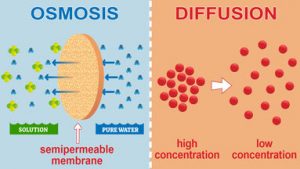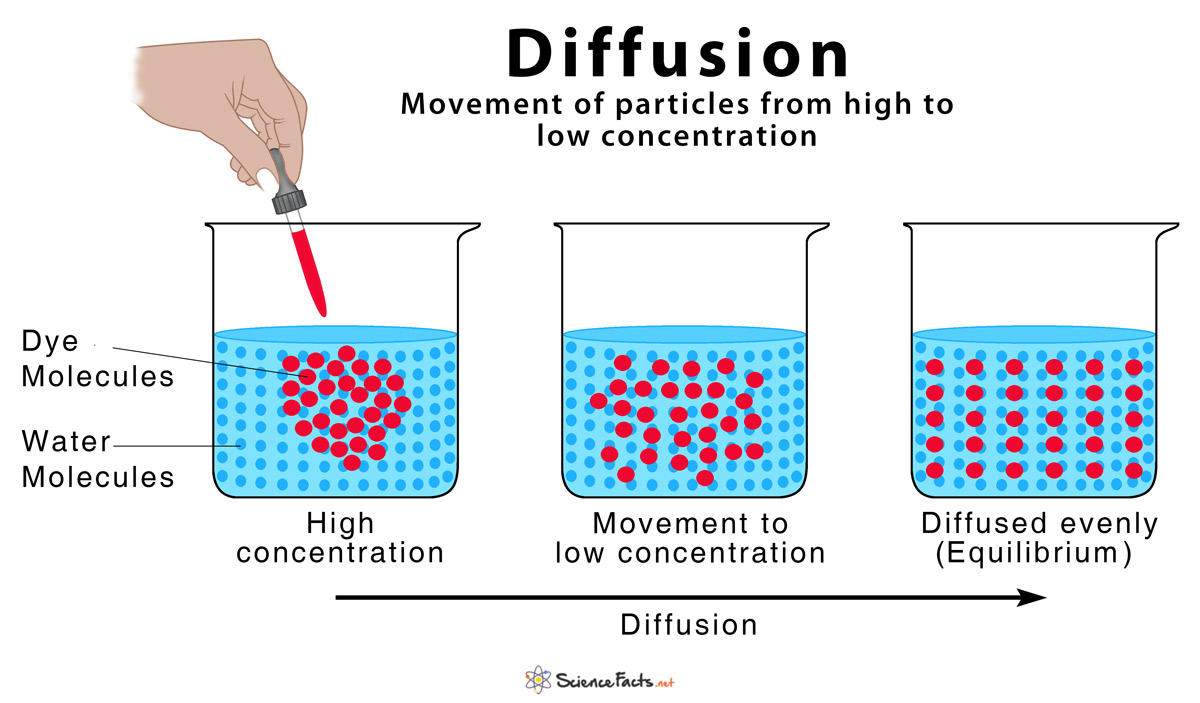What is diffusion?
Diffusion is the process of movement of molecules down a concentration gradient. It is an important process that occurs in all living things. Diffusion helps in the movement of substances in and out of cells. Molecules move from a region of higher concentration to a region of lower concentration until the concentration becomes the same everywhere.
Diffusion Types
Diffusion is widely used in various fields such as biology, physics, chemistry, etc. Diffusion can be classified into two main types: simple diffusion and facilitated diffusion.
- Simple diffusion
A process in which the substance moves across a semi-permeable membrane or into a solution without the help of transport proteins. For example, bacteria deliver small nutrients, water, and oxygen to the cytoplasm through simple diffusion.
- Facilitated diffusion
Facilitated diffusion is a passive movement of molecules across the cell membrane from the region of higher concentration to the region of lower concentration by means of a carrier molecule.
Dialysis: It is the diffusion of solutes through a selectively permeable membrane. A selectively permeable membrane is one that allows only specific ions and molecules to pass through while obstructing the movement of others.
Osmosis: It is the movement of solvent molecules from the region of lower concentration to the region of higher concentration through a semi-permeable membrane. Since water is a solvent in all living things, biologists define osmosis as the diffusion of water across a selectively permeable membrane. For example, plants take in water and minerals from their roots with the help of osmosis.

Factors Affecting Diffusion
There are some factors that affect the diffusion process, individually and collectively altering the rate and extent of diffusion. These factors include:
- Temperature.
- Interaction Area.
- Particle size.
- The slope of the concentration gradient.
Diffusion Examples
- A tea bag immersed in a cup of hot water will diffuse into the water and change colour.
- A perfume or air freshener spray will diffuse into the air by which we can feel the smell.
- The sugar dissolves evenly and sweetens the water without having to stir it.
- As we light the incense stick, its smoke diffuses into the air and spreads throughout the room.
- By adding boiling water to dry noodles, the water diffuses causing rehydration and making the dry noodles more voluminous and saturated.
Causes of diffusion
Diffusion is a natural and physical process, which occurs on its own, without stirring or shaking the solutions. Liquids and gases undergo diffusion since the molecules can move randomly. Molecules collide with each other and change direction.
Importance of diffusion
Diffusion is an important process, which intervenes in the different vital processes. As mentioned above, it is the net movement of particles, ions, molecules, solution, etc. In all living species, diffusion plays an important role in the movement of molecules during metabolic processes in cells.
Outreach is important for the following reasons:
- During the respiration process, this process helps to diffuse carbon dioxide gas through the cell membrane into the blood.
- Diffusion also occurs in plant cells. In all green plants, the water present in the soil diffuses into the plants through the hair cells of the root.
- The movement of ions through neurons that generates electrical charge is due to diffusion
